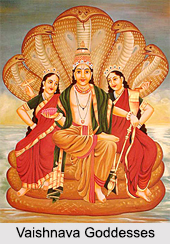 Vaishnava Goddesses are mainly Goddess Sri, Bhu Devi and Nila Devi. Bhu Devi and Nila Devi are the consorts of Lord Vishnu. The "Lakshmi Tantra" mentions 8 names as representing different forms of Shakti such as Kirti, Sri, Vijaya, Sraddha, Smriti, Medha, Drishti and Ksania.
Vaishnava Goddesses are mainly Goddess Sri, Bhu Devi and Nila Devi. Bhu Devi and Nila Devi are the consorts of Lord Vishnu. The "Lakshmi Tantra" mentions 8 names as representing different forms of Shakti such as Kirti, Sri, Vijaya, Sraddha, Smriti, Medha, Drishti and Ksania.
Goddess Sri
Goddess Sri is held to be one of the prime Goddess of Vaishnavism. The Sri Sukta asserts emphatically that Sri is the Sovereign of all living beings. The Taittiriya Sarhhita states explicitly that Sri is Vishnu-patni and also the Ruler of the universe. The Vishnu Purana, points out that Sri as the Divine mother of the universe, is eternal, inseparable from Vishnu and all-pervasive. The Purusa Sukta of the Yajur Veda mentions that Sri and Lakshmi are the consorts of Purusa who is the same as Narayana or Vishnu.
Bhu Devi and Nila Devi
Vaishnavism regards Bhu and Nila as important deities. There are Vedic passages similar to the Sri Sukta, speaking the glory of these two deities designated as Bhu Sukta and Nila Sukta. In the Bhu Sukta of Yajur Veda Samhita, Bhu Devi is explicitly described as Vishnu-patni. She is also named as "Madhavi", wife of Madhava (Vishnu) and is claimed to be the friend of Lakshmi. Bhu Devi and Nila Devi are the personification of kshama or tolerance.
Regarding Nila Devi, the Vedic passage known as the Nila Sukta also describes her as Vishnu-patni and that She is the Sovereign of the universe. The "Harivamsa" presents Nila as Goddess-incarnate to a cowherd by the name of Kumbhaka and that She was offered in wedding to God-incarnate Lord Krishna for displaying his valour. Andal, who is acknowledged as one of the 12 Tamil saints (Alvars), is depicted as the incarnation of Goddess Bhu Devi and who through her deep devotion and severe penance got united with Ranganatha (form of Vishnu) at Srirangam in South India.
Thus, among the Vaishnava Goddesses, Goddess Sri is the inseparable consort of Vishnu enjoying the same status as Vishnu. The other deities like Bhu Devi and Nila Devi, though they are accepted as Vishnu-patni, are subordinate deities with restricted role. Both are worshipped along with Lakshmi in the form of different manifestations of Goddess Lakshmi.









